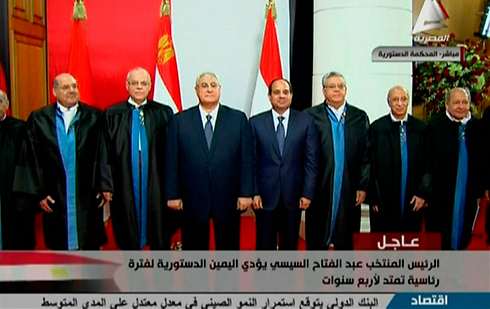
Laying low on relations with Egypt's Sisi
Analysis: In a world where our enemy's friend is our bitter enemy, Israel must not hurt Egypt's credibility by forming ties that are too strong with the new regime in Cairo. Simultaneously, Israel must take advantage of the opportunities created by the 'Arab Spring' and foster good relations with its neighbors.
The newly-elected Egyptian President, Abdel Fattah al-Sisi, did Benjamin Netanyahu and Shimon Peres a favor for in not inviting them to his swearing-in ceremony. Until the tensions in Egypt, and in fact the entire Arab world, calm down, Israel must keep a low political profile in its relations with Cairo.
This should not only be done with the new regime in Egypt, but in Israel's relations with all countries in the region, some of which we converse with behind closed doors.
Israel should be open to taking advantage of the opportunities created by the "Arab Spring" to nurture and develop good relations with its neighbors, while at the same time not overly identify with one of them.
In the current state of affairs, if Jerusalem's relationship with an Arab regime or organization, with which we seek to establish an infrastructure of understandings and cooperation, is overly visible, it is liable to hamper the move.
It is damaging for us in both the international arena and the regional arena to be identified with this or that regime in the Arab world, as long as the dust still hasn't settled over the regional upheaval.
It is important to keep in mind that in this world, the enemy's friend is our bitter enemy, and so we must not damage the credibility of the Egyptians by forming ties that are too tight or strong with the military regime that al-Sisi leads.
We must remember that Egyptians need to retain their status as fair mediators in the context of the Palestinian conflict and as a fighter for the Egypt's security interests against Salafi-Jihadis groups in Sinai.
Egypt should also be considered a stabilizing factor in our area and that helps us, because it is in its interest to uphold the peace agreement with Israel in order to maintain its good relations with the US and continue receiving assistance.
In regards to Israel's relations with Syria, Jerusalem's interest is that the current regime in Egypt will overcome the country's economic problems and that Egypt will reattain its status as a leader in the Arab world.
But Israel does not need, as a puzzling statement from Foreign Minister Avigdor Lieberman indicates, for Arab countries to openly declare their strong relations with Israel.
In fact, following the Arab upheaval, a silent partnership of interests has been formed between Israel, Jordan, Saudi Arabia and Egypt, but that doesn't need to be yelled from rooftops. Why? Because there is also the possibility that Egypt's economy continues to deteriorate and then the angry masses direct their sentiments against Israel, which might require the Egyptian army to take action.
That is why it is better that Israel aids the new regime in Egypt quietly, and it will in turn quietly work for its own interests, which serve Israel as well.
Adjusting security doctrine to regional development
The matter at hand demands of Israel a new security doctrine, in which its small partnerships with the countries of the region play a part. This is according to Professor Alex Mintz, who wrote a report on the topic in conjunction with the Institute for Policy and Strategy.
They claim that the traditional three-legged concept of Israel's security doctrine – deterrence, warning and defeating – is not enough. The regional upheaval that is still far from the finish line requires the State of Israel to add a few more limbs to the security doctrine, including regional cooperation, and what Professor Mintz terms as adaptability, meaning the need to frequently adjust the security doctrine to regional developments.
In Egypt's case it is extremely important, considering that the new regime in Egypt constitutes a rare instance in which Israel holds for this regime its entry ticket to Washington and, in extension, to the economic and military assistance it can provide. At the same time, the Egyptian regime holds the key to peace on Israel's western border.











